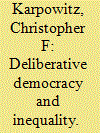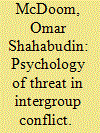| Srl | Item |
| 1 |
ID:
092870


|
|
|
|
|
| Publication |
2009.
|
| Summary/Abstract |
Deliberative democracy grounds its legitimacy largely in the ability of speakers to participate on equal terms. Yet theorists and practitioners have struggled with how to establish deliberative equality in the face of stark differences of power in liberal democracies. Designers of innovative civic forums for deliberation often aim to neutralize inequities among participants through proportional inclusion of disempowered speakers and discourses. In contrast, others argue that democratic equality is best achieved when disempowered groups deliberate in their own enclaves (interest groups, parties, and movements) before entering the broader public sphere. Borrowing from each perspective, the authors argue that there are strong reasons to incorporate enclave deliberation among the disempowered within civic forums. They support this claim by presenting case study evidence showing that participants in such forums can gain some of the same benefits of deliberation found in more heterogeneous groups (e.g., political knowledge, efficacy and trust), can consider a diversity of viewpoints rather than falling into groupthink and polarization, and can persuade external stakeholders of the legitimacy of the group's deliberations.
|
|
|
|
|
|
|
|
|
|
|
|
|
|
|
|
| 2 |
ID:
115346


|
|
|
|
|
| Publication |
2012.
|
| Summary/Abstract |
How do security threats mobilize social groups against each other? The strength of such threats lies in the power of group emotions, notably the primary emotion of fear. Fear works by activating psychological processes at the group level that polarize attitudes between different groups. An analysis of survey data, radio broadcasts, and interviews from Rwanda's civil war and genocide of 1990-94 reveals four psychosocial mechanisms at work in group polarization: boundary activation, outgroup derogation, outgroup homogenization, and ingroup cohesion. Additionally, scholarly debates on the role of emotions, material opportunities, and rationality in ethnic conflicts represent a false theoretical choice. Both emotions and material opportunities matter, and rationality and emotion are not incompatible. Two simple refinements to extant theoretical and empirical approaches are needed. First, scholars ought to distinguish between attitudes and violence in ethnic conflicts; emotions matter for the polarization of attitudes, but material and structural opportunities mediate their expression as violence. Second, scholars should pay greater attention to the extensive research in social psychology that shows that both emotion and reason interact in individual judgment and decisionmaking.
|
|
|
|
|
|
|
|
|
|
|
|
|
|
|
|